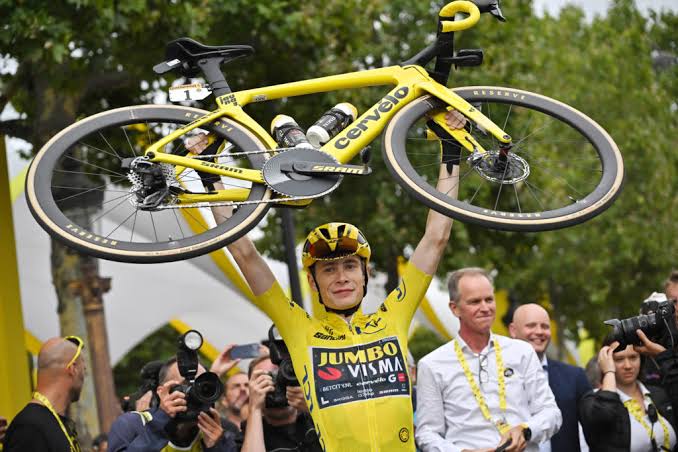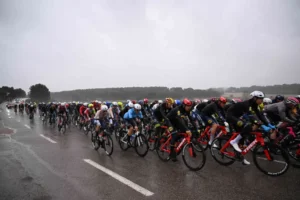
As the cycling world turns its eyes toward the 2024 season, the spotlight remains firmly fixed on Jonas Vingegaard, the reigning Tour de France champion. However, a recent admission by his long-time coach has ignited a heated debate within the cycling community: Is Vingegaard’s future in jeopardy if he doesn’t undergo urgent winter training? This controversial perspective raises questions about the pressures of professional cycling and the expectations placed on elite athletes.
The Context: Vingegaard vs. Pogacar
In recent seasons, the rivalry between Jonas Vingegaard and Tadej Pogacar has captivated cycling fans. Pogacar, a two-time Tour de France champion, has consistently pushed the boundaries of performance, leaving many to wonder if Vingegaard can keep pace. With the 2024 Tour approaching, the stakes have never been higher. Vingegaard’s coach has publicly stated that without significant improvements in training, Vingegaard may struggle to close the gap with Pogacar.
The Coach’s Statement: A Call to Action
The coach’s remarks, suggesting that an urgent winter training regimen is necessary for Vingegaard to remain competitive, have sparked outrage and concern. Critics argue that such comments place undue pressure on an athlete already burdened by expectations. Professional cycling is known for its rigorous demands, and the prospect of failing to meet those expectations can lead to mental and physical strain.
The Pressure of Expectations
Cycling is no stranger to the intense pressure placed on its stars. Vingegaard has experienced immense scrutiny since his victory at the Tour de France. Every performance is dissected, and the pressure to defend his title only heightens the expectations. The notion that a champion must constantly train harder to fend off challengers can create a toxic cycle of anxiety and burnout.
Many in the cycling community question whether this relentless drive for improvement is sustainable. The fear of falling short can lead to overtraining, injuries, and even mental health issues. In a sport that demands both physical and psychological resilience, the narrative of training harder might not always equate to better performance.
The Case for Balanced Training
While the coach’s call for urgent winter training is rooted in a desire for improvement, it raises important questions about balance in an athlete’s life. Cycling experts emphasize the importance of a well-rounded training regimen that includes rest, recovery, and mental health considerations. The best athletes are those who can adapt and find a sustainable approach to their training, rather than adhering to an unyielding standard.
Athletes like Vingegaard need to recognize that improvement is not solely defined by the hours spent training. Incorporating recovery periods, cross-training, and mental conditioning can be just as vital to a cyclist’s success. Furthermore, as cycling becomes more competitive, the emphasis on holistic training approaches may be key to longevity in the sport.
The Implications of Public Statements
Public comments from coaches and team leaders can significantly influence how athletes perceive their performance and future. When a coach suggests that drastic measures are needed to remain competitive, it can create a narrative that fosters insecurity rather than confidence. This may inadvertently affect Vingegaard’s mindset heading into the new season.
Moreover, the media plays a pivotal role in amplifying these messages, often framing them in a sensationalist light. The narrative that Vingegaard must undergo intense training to stave off failure feeds into a broader story about the cutthroat nature of professional cycling. This could result in an atmosphere of fear rather than one of growth and development.
Moving Forward: A Balanced Perspective
As the debate surrounding Vingegaard’s training intensifies, it’s essential for both the cycling community and fans to adopt a more balanced perspective. Athletes like Vingegaard should be supported in their quest for improvement, but that support must come with an understanding of the pressures they face. The focus should be on fostering an environment where athletes can thrive without the fear of failure looming over them.
In the end, whether Jonas Vingegaard takes on urgent winter training or opts for a more balanced approach, the emphasis should be on personal growth and sustainability. The rivalry with Pogacar will undoubtedly push Vingegaard to new heights, but that journey must prioritize his health and well-being. Only then can he truly shine in the competitive landscape of professional cycling.
Conclusion: The Future is Uncertain
As the 2024 season approaches, the conversation around Jonas Vingegaard’s training and future remains contentious. Will urgent winter training be the key to his success, or is a more balanced approach the answer? Only time will tell, but one thing is clear: the pressures of professional cycling are immense, and how athletes navigate these challenges will ultimately define their legacies. The cycling world watches with bated breath, eager to see how this narrative unfolds.






